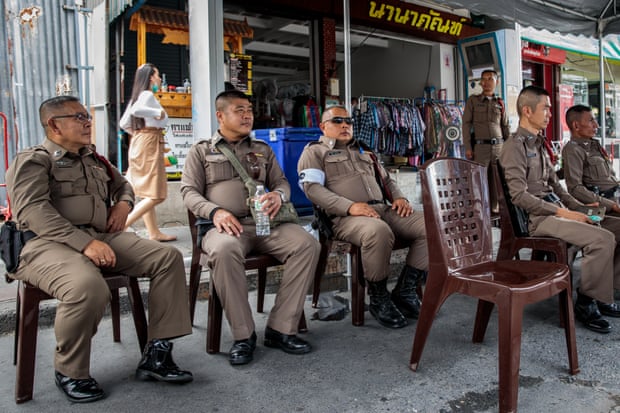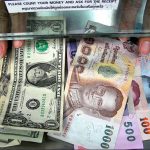Bangkok’s taxi mafia locked in deadly TURF-WAR
Tensions between rival taxi gangs in the Thai capital escalated after the arrival of ride-hailing apps. Now two men are dead.
On Thursday morning on Soi Udomsuk, a market-flanked road in east-central Bangkok, nine police officers on plastic chairs are keeping watch.
The officers, their peaked brown hats neatly lined up on trestle tables, are on the lookout for any signs of trouble between rival motorbike taxi gangs after carnage erupted in this pocket of the city on Saturday when a brutal fight broke out between two groups of drivers.
Dozens of drivers bludgeoned each other with knives and batons. Handguns were fired and two men – 20-year-old delivery bike driver Weerawat Phuengkhut and 33-year-old motorbike taxi driver Watcharin Ngamchalao – were shot dead.
Police veterans say it was the bloodiest motorbike taxi driver battle they have seen in Thailand’s capital.
They also acknowledge that, with the arrival of ride-hailing apps escalating Bangkok’s taxi turf wars, reports of violence among drivers have surged.
A growing turf war
–
The fight on Saturday took place between two groups registered with Bangkok’s Department of Land Transport (DLT).
According to one witness, the violence broke out because the gangs occupied customer pickup points that were too close for comfort.
“They had problems for a while … then it exploded,” says Boonmee Chaleamboon, 49, a moto taxi driver who saw the battle. “I thought it was a normal fight. Then I heard gunshots.”
Chaleamboon, who earns about 600 baht (£15) a day, has become used to seeing “normal fights” during his 20 years as a driver.
Many of the 8.3 million people living in Bangkok rely on motorbike taxis to zip them between gridlocked cars, and competition for riders often gets heated.
As of last month there were 104,134 recognised motorcycle taxis in the city, working from nearly 6,000 official pickup spots.
But the competition – and violence – between moto taxi drivers has increased since October 2017, when the Uber-like ride-hailing app Grab launched in Thailand.
Grab fares undercut local operators, with short rides for as little as 40 baht (£1): sometimes half that of street-hailed bikes.
Other ride-hail apps including Indonesia’s Get have launched in Thailand but Grab, founded in Malaysia in 2012, has become the most popular.
Now, there are two moto taxi factions facing off in Bangkok. Many DLT-registered drivers resent Grab drivers undercutting them, and technically operating illegally as “private” vehicles.
While Grab drivers were not involved in the fight on Saturday, stories of attacks against them have been appearing regularly in Thai news and social media.
In March a Grab driver suffered an enormous shoulder gash during a tussle over territory.
This month, another was knifed in the face.
“Sometimes attacks don’t make the news,” says Grab driver Pornchai “Boy” Chatchawalamonkul.
He is talking to the Guardian in a grimy central Bangkok cafe that has become a hangout spot for between-rides drivers.
Chatchawalamonkul, 42, runs a Facebook group where drivers share details of attacks and tips about how to avoid becoming victims, such as using specific side roads.
Scrolling through his phone, he points out lists of “red zones” where violent non-app drivers were known to prowl.
Earlier that morning he says he helped a Grab driver during an altercation with another driver who was trying to steal his customer.
They did this by literally grabbing the bemused passenger from the back of the Grab driver’s moped.
Compared with attacks depicted by photos of bloodied faces in Chatchawalamonkul’s Facebook group, it was a tame encounter.
Grab tells the Guardian that the safety of its drivers is its top priority. In a statement the company says it tells its drivers they “should avoid reciprocating, including all forms of violence and physical assaults”.
“We’ve been constantly communicating to our driver-partners to avoid confrontation when attacked, contact Grab call centre and gather evidence for the police as soon as they can.”
‘The root of the problem is deep’
Following the widely reported case of a Grab driver being stabbed in the face this month, Thailand’s top police general, Chakthip Chaijinda, said the force needed to be better at preventing similar attacks and promised more effective weapons searches at road checkpoints.
On Thursday night Soi Udomsuk is calm, police having closed the pickup spots that were at the centre of the violence on Saturday.
But other pickup places were still operating a stone’s throw up the road.
One of them was Chaleamboon’s. His location wasn’t as visible as some nearby, but he has no desire to fight for customers.
“You have to live within the rules,” he says. “It’s like the mafia.”




